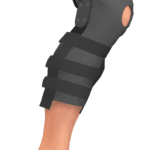
(February 8, 2019): A series of recent reports out of the Department of Health and Human Services (HHS), Office of Inspector General (OIG) underscore the Federal government’s renewed concerns with respect to orthotic braces, including underlying medical need for these items. From 1994 to 2000, OIG issued half a dozen reports pertaining to orthotics audits and investigations. However, since 2000, OIG's focus shifted to other areas of program integrity concern (such as home health and hospice). Between November 2018 and January 2019, however, OIG issued three reports regarding orthotic braces, highlighting that these items are on OIG’s radar once again. These three OIG reports are: “Medicare Improperly Paid Suppliers for Durable Medical Equipment, Prosthetics, Orthotics, and Supplies Provided to Beneficiaries During Inpatient Stays” (A-09-17-03035) (November 2018); “Pacific Medical’s Billing of Medicare for Orthotic Braces” (A-09-17-03027) (December 2018); and “Kelley Medical Equipment and Supply, LLC, Received Unallowable Medicare Payments for Orthotic Braces” (A-09-17-03030) (January 2019). Over the past month, we have seen a significant uptick in the number of new orthotic audits and investigations by Medicare contractors, including Unified Program Integrity Contractors (UPICs). The purpose of this article is to discuss a number of the program integrity issues that Durable Medical Equipment (DME) suppliers are facing in connection with UPIC audits of orthotic claims billed to Medicare.
I. Medicare Coverage and Payment Requirements
Medicare Part B covers Durable Medical Equipment, Prosthetics, Orthotics, and Supplies (DMEPOS), including orthotic braces. To be paid by Medicare, a service or an item must be reasonable and necessary for the diagnosis or treatment of illness or injury or to improve the functioning of a malformed body member. Orthotic braces are defined as “rigid and semi-rigid devices which are used for the purpose of supporting a weak or deformed body member or restricting or eliminating motion in a diseased or injured part of the body.” Examples of orthotic braces include back, knee, and ankle-foot braces.
The DME Medicare Administrative Contractors (MAC) have developed Local Coverage Determinations (LCDs) for most covered orthotic braces (one of the most notable exceptions, however, is shoulder braces). The LCDs outline the conditions under which DME MACs will pay suppliers for those braces. For example, the LCD for back braces or “spinal orthoses” (LCD L33790) provides that: “A spinal orthosis (L0450 - L0651) is covered when it is ordered for one of the following indications:
- To reduce pain by restricting mobility of the trunk; or
- To facilitate healing following an injury to the spine or related soft tissues; or
- To facilitate healing following a surgical procedure on the spine or related soft tissue; or
- To otherwise support weak spinal muscles and/or a deformed spine.”
Before submitting a claim for an orthotic brace to the DME MAC, a supplier must have on file the following:
- Written documentation of a verbal order or a preliminary written order from the treating physician,
- A detailed written order from the treating physician,
- Information from the treating physician concerning the beneficiary’s diagnosis,
- Any information required for the use of specific modifiers, and
- Proof of delivery of the orthotic brace to the beneficiary.
The Medicare Program Integrity Manual specifically emphasizes that a supplier should “obtain as much documentation from the beneficiary’s medical record as it determines necessary to assure itself that the orthotic brace meets Medicare requirements”.
II. OIG’s Recent Reports:
In the first of OIG’s recent reports, dated November 2018, OIG found that Medicare should not have paid suppliers any of the $34 million for DMEPOS items that were provided during inpatient stays. Notably, 43% of the total overpayment identified by OIG was for prosthetics and orthotics, including braces. Separate from the $34 million figure, OIG determined that Medicare beneficiaries inappropriately paid $8.7 million in deductibles and coinsurance to the suppliers for the DMEPOS items. Generally, during an inpatient stay, Medicare should not pay a supplier for DMEPOS items provided to a Medicare beneficiary. The items are supposed to be provided directly by the inpatient facility or under arrangements between the facility and the supplier. This is because the Medicare payments made to the facilities represent payments in full for all inpatient hospital services, including DMEPOS items. OIG attributed the inappropriate payments for these supplies, in part, to inadequate Common Working File (CWF) pre-payment and post-payment edits which failed to prevent or detect the overpayments. OIG determined that if the system edits had been designed properly since 2008, Medicare could have saved $223.1 million and beneficiaries could have saved $56.3 million in deductibles and coinsurance. Based on its findings, OIG recommended in part that the Centers for Medicare & Medicaid Services (CMS) recover the $34 million and that the suppliers refund the deductible and coinsurance amounts to the Medicare beneficiaries.
OIG’s other two reports, dated December 2018 and January 2019 respectively, were quite similar to one another. OIG audited a supplier of orthotic braces in Tracy, California and a supplier of orthotic braces in Durant, Oklahoma for the same audit period, January 1, 2015 through March 31, 2017. In both cases, the overpayments identified by OIG were exclusively attributed to the failure on the part of the suppliers to establish medical need for some of the orthotic braces. In the California case, OIG determined that the supplier billed for orthotic braces that were not medically necessary for nine claims and could not provide medical records for two claims. In the Oklahoma case, OIG determined that the supplier billed for orthotic braces that were not medically necessary for 67 beneficiaries and could not provide medical records for nine beneficiaries. OIG stated verbatim with respect to both suppliers: “These deficiencies occurred because [the supplier] did not always obtain sufficient information from the beneficiaries' medical records to assure itself that the claims for orthotic braces met Medicare requirements.” An example of a medically unnecessary back brace was provided by OIG as follows:
Medicare paid [the Oklahoma supplier] $754 for providing a back brace to a 62-year-old beneficiary. According to the physician order dated March 7, 2017, the brace was prescribed for lower back pain. However, the medical records did not indicate a complaint of back pain, and there was no mention of a back brace. Rather, according to the medical records, the beneficiary saw his physician on March 2, 2017, for relief of persistent cough and chest congestion. As a result, the independent medical review contractor found that the back brace was not medically necessary.
Based on its findings, OIG recommended to both suppliers that they (1) refund the identified overpayments; (2) assess their claims outside of OIG’s audit period and refund any identified overpayments within 60 days; and (3) obtain as much information from beneficiary medical records as the suppliers deem necessary to assure themselves that claims for orthotic braces meet Medicare requirements.
III. Our Recommendations for Suppliers of Orthotic Braces:
Given the audit and investigation activity surrounding suppliers of orthotic braces, it is important for suppliers to reassess Medicare coverage and payment requirements and their documentation practices. In particular, suppliers need to ensure they are obtaining and maintaining sufficient medical records from the ordering providers. As we have discussed in previous articles, while suppliers are not entitled to make determinations regarding medical need, they are tasked with evaluating medical records and ensuring that the records support the Medicare beneficiary’s medical need for the orthotic brace prescribed. The OIG reports make very clear that the party responsible for an overpayment is the supplier, and not the ordering provider. In order to ensure you are satisfying your documentation obligations, we recommend that you:
- Consult with your healthcare attorney and have them review a sample of claims. The best way to ensure that your claims are satisfying Medicare coverage and payment rules, and that you are meeting your documentation obligations, is to have a third party with strong knowledge in this area assess a sample of your claims who can then give you objective feedback and constructive recommendations.
- Train and retrain your staff on Medicare coverage and payment rules and supplier documentation requirements. As a business owner, you are likely relying on a team of employees to obtain and review the necessary documentation and to process the claims for the orthotic braces. You are only as strong as your weakest link, as they say. Sharing these OIG reports with your employees and setting up a team conference to discuss them would be a great start! Your healthcare attorney can likely arrange a conference agenda and guide your team through OIG’s reports, as well as effectively educate you and your employees on Medicare coverage and payment rules and supplier documentation requirements.
- Implement a compliance plan tailored to the scale of your business and the DME supplies you distribute so that compliance will persist in the long-term. Ultimately, regular auditing of claims and regular training of employees, as well as sound policies and procedures, are the most effective ways to ensure long-term, ongoing compliance throughout the life of your business. Medicare rules and audit activity are constantly evolving. A compliance plan is the way to stay on your game.
We anticipate ongoing UPIC audits and investigations pertaining to orthotic braces on account of OIG’s findings and concerns. Our attorneys can assist you if you have received notice from your local UPIC, or if you are interested in taking proactive steps, like developing a compliance plan or auditing your claims internally.

